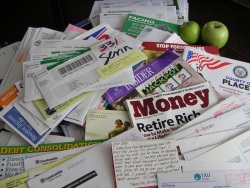This foreclosure documentation mess still seems to be getting a lot of attention. Pundits on television, opinion writers in print, and even the Attorneys General of nearly every state are all riled up about it.
Everyone seems to want to “stick it to the man” and make the banks pay for making false claims about having all the right paperwork and following all the right procedures.
I get that there are legal processes in place for a reason, and I agree that it’s not okay for the banks to just ignore the law when it happens to inconvenience them, but here’s something that’s been bugging me about all this outrage.
How is what the banks are doing today any different from what they did throughout the years that the housing bubble was inflating?
Many of the people who are losing “their” homes today are the same people who were only able to get loans that allowed them to overpay for those homes in the first place thanks to the exact same sloppy procedures at the banks. They were more than happy to take advantage of lousy (or often a complete lack of) documentation when it got them into a home, but when the same set of rules are applied to kick them back out, suddenly they are crying foul.
Obviously not everyone fits my description of the typical foreclosure crisis “victim.” Those who are losing homes on which they never missed a payment or that they own outright clearly have every reason to be outraged at the banks. However, people who stopped paying their mortgage and are hoping to take advantage of some technicality to get “their” home back are only kidding themselves.
Here’s my proposed solution to the whole mess. Forget foreclosure freezes. Forget endless reviews of millions of documents. Here’s my 3-point plan:
- Free legal counsel for anyone who is current on their mortgage but has been truly wrongfully foreclosed.
- Every time a bank is found by the courts to have initiated any degree of foreclosure proceedings on someone who was not behind on their mortgage, a $10 million fee is levied against the bank.
- Fees collected pay for the legal representation of future legitimate claimants against the bank.
The basic idea is to make it easy for people who have actually been victimized (not just the victims of documentation technicalities) to obtain appropriate recourse against the banks, and to make it really hurt when the bank actually screws up. This provides a strong incentive for the banks to get things right and a just outcome for the times that they get it wrong.
What do you think? Would something like this be reasonable, or have I yet again displayed my ignorance of complex legal and economic issues?
